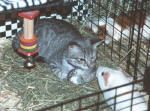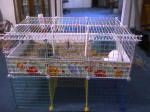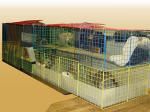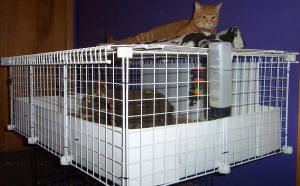Cage Safety
Cat, Dog, & Kid-Proofing your Cage
 There are predators and there are prey animals. Guinea pigs are a PREY animal. Cats and dogs are predators. Many prey animals in the wild have evolved with their own unique survival mechanisms. Please understand that a DOMESTICATED guinea pig will not and cannot survive in the wild. And by domesticated, we don't mean one that has been around people and is nice and friendly. We mean any guinea pig that wasn't found running wild in their native habitat of South America. Guinea pigs have been bred as pets and for show by hobby breeders. They are bred to look pretty on the show table and not for survival in the wild. Nor do the hobbyists breed for health or longevity or to 'improve the breed' as many would claim. Guinea pigs are not bred to withstand hot or cold temperatures, dramatic changes in humidity or inclement weather.
There are predators and there are prey animals. Guinea pigs are a PREY animal. Cats and dogs are predators. Many prey animals in the wild have evolved with their own unique survival mechanisms. Please understand that a DOMESTICATED guinea pig will not and cannot survive in the wild. And by domesticated, we don't mean one that has been around people and is nice and friendly. We mean any guinea pig that wasn't found running wild in their native habitat of South America. Guinea pigs have been bred as pets and for show by hobby breeders. They are bred to look pretty on the show table and not for survival in the wild. Nor do the hobbyists breed for health or longevity or to 'improve the breed' as many would claim. Guinea pigs are not bred to withstand hot or cold temperatures, dramatic changes in humidity or inclement weather.
The guinea pig's only instinctual defense mechanism is to run and hide from predators. It is up to you to ensure that no predators--dogs, cats, birds, raccoons, snakes, ferrets, rats are able to get to your defenseless guinea pigs. And unfortunately, that can include kids--young kids who don't know any better and older kids who do and may be visiting.
Guinea Pigs belong INDOORS in an Appropriate Location
If you have a cat or dog inside, your guinea pig doesn't go outside. Did you know that the US Department of Agriculture states in their regulations governing commercial guinea pig breeders and dealers that it is illegal to house guinea pigs in an outdoor area or building without means of controlling the temperature? They recognize that it is simply not appropriate or healthy for domesticated guinea pigs to live outdoors in the United States. The regulations state that ambient temperature must be maintained between 60°F and 85°F and that adequate ventilation be provided so as to minimize drafts, odors, and moisture condensation.Guinea pigs easily succumb to heat stroke (fatal) at temperatures over 85°F -- even if they are in the shade.
The C&C cage design is NOT intended to be used outdoors, at all. For more information on appropriate locations for the cage, please visit the Cage Location page.
How do Cats and Dogs do with Guinea Pigs?

 A C&C cage can be made to be incredibly strong -- as strong as any commercially available cage, and in many cases, more so. However, no cage is likely to withstand a large, aggressive dog attacking with blood lust. Common sense must prevail in your choice of pets and environment. The average dog and cat is usually just fine with guinea pigs. They tend to be curious or playful with guinea pigs or sometimes even afraid of them. However, you can never assume that just because your dog or cat seems okay most of the time when it's around your cavies that it will be all the time. You must always be aware that dogs or cats are predators to guinea pigs. A dog or cat can unintentionally do serious harm to a guinea pig even if they think they are only playing. Some breeds of dogs are more prone to viewing the guinea pig as prey than others.
A C&C cage can be made to be incredibly strong -- as strong as any commercially available cage, and in many cases, more so. However, no cage is likely to withstand a large, aggressive dog attacking with blood lust. Common sense must prevail in your choice of pets and environment. The average dog and cat is usually just fine with guinea pigs. They tend to be curious or playful with guinea pigs or sometimes even afraid of them. However, you can never assume that just because your dog or cat seems okay most of the time when it's around your cavies that it will be all the time. You must always be aware that dogs or cats are predators to guinea pigs. A dog or cat can unintentionally do serious harm to a guinea pig even if they think they are only playing. Some breeds of dogs are more prone to viewing the guinea pig as prey than others.
|
Please be sure to ask questions on the FORUM, as the photo comments and guest book comments are not monitored or replied to.
Closed Cages
These are enclosed cages, usually to keep cats and small dogs (or small children) away from the guinea pigs.
| Closed, Two-Level Cages
These are two-level cages that have been completely enclosed for safety from cats, dogs, and small children. For ramps, please see the Features and Options page.
|




This was so interesting I did not know it was illegal to house a guinea pig outdoors without being able to control the temperature. I'm glad there are regulations to protect these animals. Very informative.
ReplyDelete